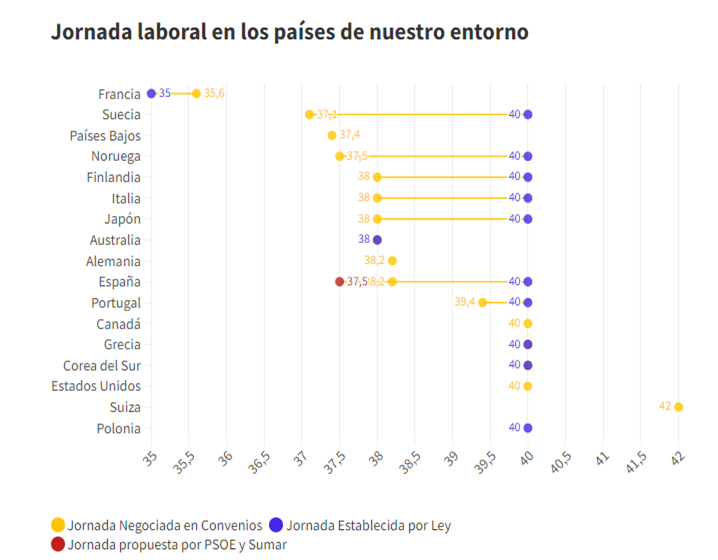
Reducing the working day to 37.5 hours in Spain: everything you need to know.
A few months ago, the coalition government between PSOE and SUMAR announced one of its most innovative measures: the reduction of the maximum working week from 40 hours to 37.5 hours per week in 2025, with a transition period in 2024 of 38.5 hours, which makes a large part of the public wonder, is there already a fixed date for applying the reduction in working hours?
On 25 January last, negotiations began at the Social Dialogue Round Table for the reduction of the 40-hour maximum working day in article 34 of the Workers' Statute. Faced with the employers' refusal to accept certain aspects of the measure, last June the Ministry of Labour gave CEOE and CEPYME an ultimatum to propose an alternative to the 37.5 hour reduction in the working day. Therefore, the Ministry of Labour communicated that it was willing to move forward with the measure even without the CEOE and CEPYME, changing the Social Dialogue Table from being tripartite (Employers, Trade Unions and Ministry of Labour) to only bipartite. The employers insist on delaying the effectiveness of the measure to 2026.
It is true that, in order to reach an agreement with the employers, the Ministry of Labour is considering giving flexibility to the application of the measure, proposing that the start of the 37.5 hour working day reduction be for the whole of 2025, i.e. that the calculation of the hours worked will be based on the annual calculation of hours. This would leave companies with a certain ability to distribute working hours irregularly, thus allowing them to cover certain seasonal needs.
Another question that arises regarding the measure is whether it will reduce wages in proportion to the reduction in working hours. It seems that the new law does not intend this to be the case in any case, with all workers affected by the new working day maintaining the salary they had been receiving until then. Nor will the current SMI (Minimum Interprofessional Wage) be affected and it will remain at the current €1,134 per month, distributed in 14 payments.
As for half-days, it also seems to be true that they will go from 20 hours a week to 19 hours, and that part-time contracts that exceed or equal the new maximum working week of 37.5 hours will automatically be converted into full-time contracts.
As far as overtime is concerned, the Ministry of Labour has no intention of extending the maximum limit of 80 hours per year allowed, and any time in excess of the 37.5 hour maximum working week will be counted as overtime or additional hours, as appropriate.
Workers who, by Collective Bargaining Agreement, work a 37.5 hour working week or less, will not be affected, so this measure will mainly benefit the 12 million workers who do not have a reduced maximum working week.
As for the Government's proposals to make the reduction in working hours effective, although the details have yet to be defined, a new digital working day register is to be created, accessible to workers, workers' representatives, trade unions and the Labour Inspectorate.
The Ministry of Labour is also considering tougher penalties for employers for non-compliance with the maximum working day limits, with the introduction of new penalties for companies for each worker who fails to comply with this measure, instead of a single penalty for several workers.
Even so, the information available is still limited, and we will have to continue to wait for the draft bill to be developed in order to find out new details and dates for the implementation of the measures. What does seem to be certain is that Spain will join the trend of reducing working hours in European countries, such as the Netherlands, with a working week of 37.4 hours negotiated by Collective Bargaining Agreement, or France, where workers have a maximum working week of 35 hours established by law.












